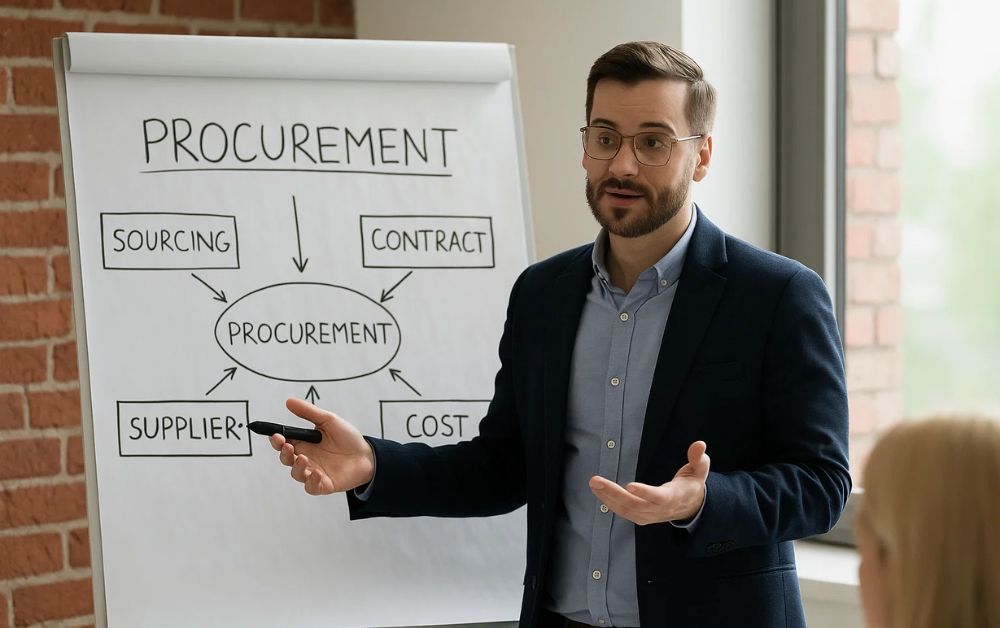Avoiding Delays: How Smart Procurement Prevents Project Bottlenecks
In the construction sector, time is money. Delays not only increase costs but also affect the reputation of contractors and developers. One of the most common causes of project delays is inefficiency in procurement processes. Without careful planning, poor vendor choices, incomplete documentation, or logistical hurdles, even the most well-designed project can face bottlenecks.
This is where smart procurement management makes a difference. By streamlining the flow of materials, services, and documentation, contractors can avoid unnecessary downtime and keep projects on schedule. Let’s explore how smart procurement can prevent bottlenecks, focusing on vendor selection, documentation, and logistics.

The Role of Smart Procurement in Construction
Procurement is not simply about buying materials. It is a strategic function that involves selecting the right suppliers, negotiating favorable terms, ensuring compliance, and managing logistics effectively. In the Gulf construction industry—where projects are large, timelines are strict, and supply chains are complex—procurement must be proactive rather than reactive.
Smart procurement management ensures that materials and services arrive on time, at the right quality, and within budget, thereby reducing risks of stoppages or delays.
Vendor Selection: The First Step in Avoiding Delays
The foundation of efficient procurement lies in choosing the right vendors. An unreliable vendor can derail an entire project by delivering poor-quality materials, failing to meet deadlines, or not adhering to standards.
Tips for Smart Vendor Selection:
- Evaluate Experience and Track Record: Check if the vendor has successfully supplied materials or services for projects of similar scale.
- Assess Financial Stability: A financially unstable vendor may struggle with production or delivery commitments.
- Quality Certifications: Look for suppliers who meet international or regional quality standards.
- References and Reviews: Speak with other contractors who have worked with the vendor to gauge reliability.
- Backup Capacity: Ensure the vendor has contingency plans for emergencies, such as sudden demand spikes or supply shortages.
For example, contractors in the Gulf often prefer vendors with local warehouses or distribution centers, as these reduce lead times and mitigate risks associated with overseas shipments.
Documentation: The Backbone of Procurement Efficiency
Even with the best vendors, poor documentation can stall a project. Missing contracts, unclear specifications, or delayed approvals can result in disputes and unnecessary delays.
Tips for Effective Documentation:
- Clear Contracts: Draft contracts that clearly outline delivery schedules, penalties for delays, and quality requirements.
- Standardized Processes: Use standardized purchase orders and invoices to avoid confusion.
- Digital Records: Implement digital procurement platforms to track orders, approvals, and payments in real time.
- Compliance Assurance: Ensure all documentation aligns with regional laws, including import regulations for materials.
- Regular Updates: Keep all stakeholders informed with updated documentation to avoid miscommunication.
By maintaining robust documentation practices, contractors can reduce administrative delays and ensure accountability across the supply chain.
Logistics: The Final Piece of the Puzzle
Logistics is where planning meets execution. Even if vendors are reliable and documentation is in place, poor logistics planning can delay deliveries, especially in large-scale Gulf projects where materials often travel long distances.
Tips for Smart Logistics Management:
- Plan Ahead: Align delivery schedules with construction milestones to avoid last-minute rushes.
- Work with Reliable Transport Partners: Choose logistics providers experienced in handling construction materials.
- Consider Regional Challenges: Account for Gulf-specific challenges like port congestion, customs clearance, and high summer heat, which may affect transportation.
- Track Shipments: Utilize GPS and digital tracking tools to monitor shipments in real-time.
- Warehouse Management: Establish temporary storage facilities near the site to reduce delays caused by on-demand deliveries.
Efficient logistics not only keep projects running smoothly but also reduce costs by avoiding idle labor and equipment waiting for materials to arrive.
The Benefits of Smart Procurement
When vendor selection, documentation, and logistics are managed strategically, contractors can achieve:
- On-Time Project Delivery: Smooth material flow ensures work doesn’t stop due to shortages.
- Cost Savings: Avoiding emergency purchases or expedited shipping reduces unnecessary expenses.
- Quality Assurance: Proper vetting and documentation ensure only compliant materials reach the site.
- Risk Mitigation: Reliable processes help contractors adapt to unforeseen challenges without significant delays.
In the Gulf, where mega-projects like skyscrapers, airports, and industrial plants demand precision and speed, the importance of smart procurement cannot be overstated.

Conclusion
Construction delays often stem from procurement missteps—poor vendor choices, incomplete documentation, and weak logistics planning. Smart procurement management addresses these challenges by ensuring reliable suppliers, transparent contracts, and efficient material flow. Among companies helping Gulf contractors achieve this, Taasim LLC stands out. With its expertise in procurement solutions, Taasim LLC ensures that projects move forward without bottlenecks, helping contractors deliver on time and within budget. For builders aiming to avoid delays and safeguard their reputation, partnering with the right procurement specialists is the smartest move.




